C. Litka's Blog, page 28
October 7, 2023
The Saturday Morning Post (No.16)

This week we return to a Furrowed Middlebrow offering, with a D. E. Stevenson story; Mrs. Tim Gets a Job. Mrs. Tim is the title character in four books of Stevenson. Mrs. Tim is the wife of a British Army Officer, and as such, is often living on her own while her husband is overseas defending the British Empire. A couple of decades ago, I may have read at least one of the earlier books, but if so I've no recollection of the story. I don't think they need to be read in order, but it probably helps. I chose this title because it was one of the most highly rated titles on Amazon of the Furrowed Middlebrow collection.
My reviewer criteria. I like light, entertaining novels. I like smaller scale stories rather than epics. I like character focused novels featuring pleasant characters, with a minimum number of unpleasant ones. I greatly value clever and witty writing. I like first person, or close third person narratives. I dislike a lot of "head jumping" between POVs and flashbacks. I want a story, not a puzzle. While I am not opposed to violence, I dislike gore for the sake of gore. I find long and elaborate fight, action, and battle sequences tedious. Plot holes and things that happen for the convenience of the author annoy me. And I fear I'm a born critic in that I don't mind pointing out what I don't like in a story. However, I lay no claim to be the final arbitrator of style and taste, you need to decide for yourself what you like or dislike in a book.
Your opinions are always welcome. Comment below.
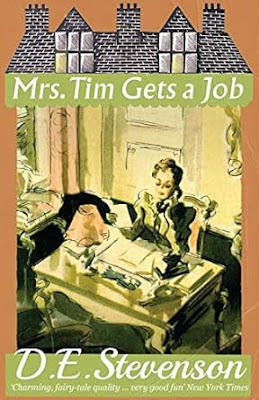
Mrs. Tim Gets A Job by D. E. Stevenson B-While I enjoyed this story, I think I prefer the writing of Molly Clavering a bit more than that of Stevenson. Perhaps this is because I seem to detect a slight sense of detachment or coolness in Stevenson's writing, making it for me, just a little less engaging. Anyway, this story, the third of four Mrs. Tim stories, is set in 1946. Mrs. Tim, the wife of the British Army officer, Tim Christie, now serving in Egypt, decides to apply for and takes the job of helping run a hotel in the Scottish Border lands, though with a great deal of misgivings. The hotel owner has been forced to turn her ancestral home into a hotel in order to be able to maintain the large manor house. However, this owner is not a people person, being short and gruff with guests, so she hires Mrs. Tim to help her not only run the place, but to deal with the guests.
The story is written in the format of Mrs. Tim's diary entries, making it a first person narrative, my favorite story format. It chronicles the events leading up to her accepting the job, her experiences as she settles into the job, plus the all the various people she encounters on her travel, hotel guests, and fellow employees, each with their own little stories and, usually, romantic problems.
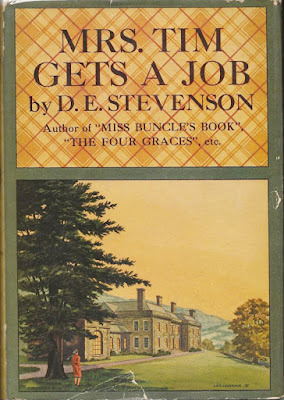
I felt the story ended a little abruptly, as if Stevenson had reached her word count and decided that she just needed to tie up all the the last of the little subplots in play, and call it a day. However, with this type of story, one without any important overarching narrative, allows for this type of ending.
One feature of stories like this one set in post war England is a glimpse of how long after the war ended that food rationing and a general scarcity of products remained in place. Well into the 50's times were tough in an England exhausted by six years of war. This is in stark contrast to the boom years after the war in America.
The one other thing that struck me in this story was how Stevenson treated the status of Mrs. Tim, either as the wife of a British Army officer, or by birth. She was portrayed as someone who was above the need to work - several of the characters, including her husband expressed this opinion. And while Mrs. Tim went to work anyway, she never seemed to be completely committed to it as a job. It was just something to do in the moment, after she had been turned out of the house she had been renting prior to this and with her kids in boarding schools. For example, she expected to just take the summer off from the job to spend with her two children, as guests at some relative's country estate. Keeping the hotel running in season wasn't her problem. Nice work if you can get it. One of the interesting things about these novels, no matter how idealized the stories are, is the underlying assumptions about class and society held by the writers of these stories. Most of D E Stevenson's heroines never have to work outside of the home and always have servants to do the domestic work for them inside of it, even if some of them have to scrape by on some small inheritance. The title character in Miss Buncle's Book, is an example, she had to make do with only one servant to keep house and cook for her, until she get married. Married, she then employs several servants, a cook, a maid, and a nanny to look after her children. As I said, nice work if you can get it. I suspect they reflect D E Stevenson's own life and attitude.
For my next reading adventure I am staying in the fictional Britain of the 1920's & 30's (and beyond), but hosted not by a writer of light or comic novels, but a writer of literary fiction. Stay turned to see how that goes.
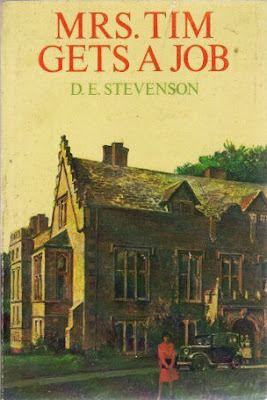
October 4, 2023
SPFBO Observations; Reflections On My Writing
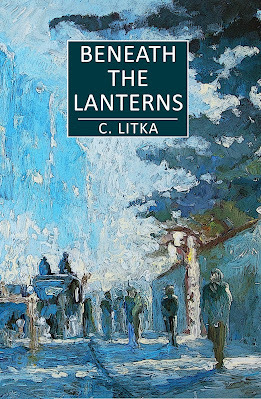
As I mentioned previously, having entered Beneath the Lanterns in the Self Published Fantasy Blog Off contest netted me a nice review by Liis. There were several things about the review that struck me as interesting. The great thing about reviews like this is that they allow you to see your work from a different angle, with different eyes. This passage struck me as something I never considered:
"Litka strikes me as a confident author. Confident in what he does and how he wants to tell this story. He doesn't need to rely on the shock factor to keep the hooks in the reader."
I never thought of myself as a confident author in the sense that other authors might be less confident than me. I would think most authors write their story and only publish it when they have confidence that the story is good enough, if not great. Undoubtedly a lot of authors struggle to some degree or another while writing that story, but I don't think that struggle is reflected in the finished work. What I suspect the reviewer to be saying is that I wrote, and entered, a book in the contest that does not, in story or style, conform to the current fashion in fantasy. If that is the case, judging from the reviews of other contestants I've glanced over, she would be right. There is reason for this; I am not a fan of current fantasy and have read very little of it, and this was even more true when I wrote the story in 2018.
But perhaps there is a more vague meaning, which may be boiled down to knowing what I'm doing. As an author you need to know what you're doing. You need to know your audience; what they expect, and then deliver what they expect and more, if you can. But the key to writing with confidence is knowing who you are writing for.
I do. And I keep it simple. My audience is me.
This singularity of focus makes writing a whole lot easier. Knowing what exactly it is that I like to read means that it just becomes a matter of dreaming up a story that appeals to me and then writing it down. It's just that simple... Right. In any event, all this method then requires is a leap of faith that there are readers who like what I like. In the beginning that may have been a blind leap of faith, but over the years I know now that there are some people will like what I like. And that is enough.
I should mention that this is probably not be the best approach to take if you are aiming to write commercial fiction, i.e. stories designed to sell books in large numbers to a large audience, unless you yourself are very immersed in the large audience you are writing for, and thus, know that you and they want in a story. I am sure that there are authors who are lucky enough to find themselves in that position, but I suspect that for many others, to write books that sell in great numbers, they need to carefully study what sells, and then make themselves write books with the potential to sell. Writing for them, is a job.
Since I don't need or want a job, I write what pleases me, accepting that my work will appeal to a limited audience. I don't know if this is confidence so much as accepting that what will be, will be. I think this in either case, it is a pretty good attitude for most authors. Writing what's in your heart and head, brings out the best your creatively, while at the same time, making writing so much simpler and rewarding, independent of sales numbers.
This is not to say that I never take my readership into account. I do, sometimes. For example I set out to write the Nine Star Nebula Mystery/Adventure stories in part because they are set in the same setting as my most popular book, The Bright Black Sea. That said, I wrote them as mystery stories, using different characters and a different solar system, so they were not carbon copies of what I'd written before. I wrote them as mysteries, in part because I had something to say about mystery stories. The one thing I hate about mystery stories is that they almost always revolve around a murder, or two, or three... I don't know if mystery writers are just too lazy to come up with a mystery that matters that doesn't involve someone getting killed, or if murder is what the readers, i.e. the market, demand in mystery stories. Whatever. In my mysteries, since I still write for myself, none of them involve investigating a murder.
Liis also said in the review:
"What might not work for some readers? The Prose. I don't know what it is that makes readers shun lyrical prose these days. It's like an insurmountable mountain that masses, looking for quick and easy gratification, are unwilling to climb. But when you get into the prose, when you start to go with the flow, when you give it a chance the reward is worth it. I wouldn't say this title is overly descriptive, it is exactly what it advertises itself for - an old fashioned novel of adventure."
This was something of a head scratcher for me. I certainly don't think that I write with lyrical prose. Lord Dunsany writes lyrical fantasy. I don't. English for Liis, a Estonian who has lived in Ireland for a dozen years, is a second language, so that might explain it. I try to write in a conversational style, and I will admit that I often use two words where one will do, but I don't know if all that makes my writing "lyrical" as I understand the word, compared to modern fantasy writing.
Perhaps what she meant is that I have a distinctive narrative voice. I would like to believe I do. I try to make the narration flow as if the narrator was speaking to you, the reader. Plus, I am not concerned with taking "unnecessary" words out, like the writing advice I frequently come across tells me to do. So maybe my style is not as lean as the current style of writing, but I can't say for certain, as I've not read a lot of modern fantasy, especially self published fantasy. Most likely my writing reflects the books I love, and many of those were written in the first half of the last century which maybe what makes my writing different enough to comment about
However, this is once again a lesson illustrated in the last post; you write your book, your readers make it their own, and that version may not seem like the one you wrote. But you have to let go of your story. You have to let it, not you, speak to your readers. And the story may be better for it.
But enough of SPFBO. Next week... Writing Season. Stay tuned.
September 30, 2023
The Saturday Morning Post (No.15)

This week we have three fantasy books that I sampled and decided that they were not written for me. The first is War Bunny, Book 1 of The War Bunny Chronicles by Christopher St. John, the second is The Way of Edan, Book One of the Edan Trilogy by Philip Chase, and the third is Perseus Kills His Grandfather by Richard L Pastore.
My reviewer criteria. I like light, entertaining novels. I like smaller scale stories rather than epics. I like character focused novels featuring pleasant characters, with a minimum number of unpleasant ones. I greatly value clever and witty writing. I like first person, or close third person narratives. I dislike a lot of "head jumping" between POVs and flashbacks. I want a story, not a puzzle. While I am not opposed to violence, I dislike gore for the sake of gore. I find long and elaborate fight, action, and battle sequences tedious. Plot holes and things that happen for the convenience of the author annoy me. And I fear I'm a born critic in that I don't mind pointing out what I don't like in a story. However, I lay no claim to be the final arbitrator of style and taste, you need to decide for yourself what you like or dislike in a book.
Your opinions are always welcome. Comment below.
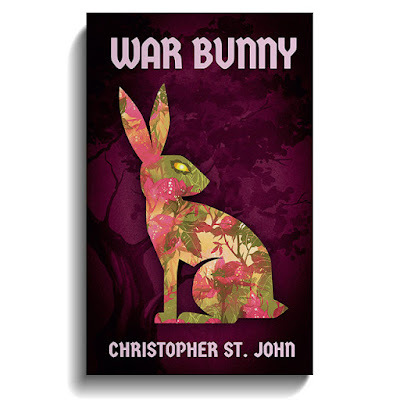
War Bunny by Christopher St. John DNF
War Bunny is a fantasy story using animal protagonist, similar to Richard Adams's Watership Down, which I have not read, Brian Jacques's Redwall series of which I've read the first book, and Kenneth Grahame's The Wind in the Willows, which I've read, plus ten thousand similar books written for kids. It came to my attention via Berthold Gambrel's excellent book review blog, A Ruined Chapel by Moonlight, and his review here. To get a fuller idea of the story, read his review. The book was free at the time so I picked it up. (See how that works?)
The story appears to be set in an post-apocalyptical world where humans are missing and the animals uplifted. The rabbit talk and have an oral tradition of books and a religion. There is probably a fuller explanation of the world in the books, as it is the first of a three book series, but accepting talking animals is the price of admission. I had no problem doing that, though I like some consistency, i.e. the rabbits are not tool using creatures - they seem to be pretty much like your garden variety rabbit, but with speech, a hierarchy, and a religion. On the other hand, an itinerate trader water rat uses his paws as hands and carries his goods in a backpack, i.e. he is given a much more andromorphic treatment. A minor quibble, since Grahame in Wind in the Willows has Mr Toad, a toad, driving not only a horse drawn caravan, but a train, as well as interacting with humans. But still, I like consistency.
My problem with this story - and it is my problem, not the author's - is not those apparent inconsistencies, but rather that, one, it starts with the now seemingly obligatory action scene; the title bunny being chased and just escaping being eaten by a fox. I really don't like that type of opening. Next it has too many point of view characters, jumping from one to another just in the first 8% of the book. I am not a fan of multi-POV stories, which are so popular these days. It also has a violent weasel attack on the rabbit warden in the first 8% of the book, so it's not a kid's book. Finally, there was all this talk about the rabbit's religion. Books heavy on religion are a non-starter with me. I've never read Dune, having passed it up when it first was released, as the blurb mentioned a hero as a messiah. It just turns me off - 12 years of Catholic education can do that to a fellow.
So, as I said from the beginning, all of the reasons I stopped reading this story are my own bugaboos, not the author's. You can't please every reader and shouldn't try, so after reading Berthold's review, and my thoughts, if you think you might like it, give it a try, especially if it is still free.
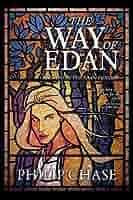
The Way of Edan by Philip Chase DNF
Dr Philip Chase is a medievalist, with a PhD in English Literature who teaches college courses on writing, medieval literature, and fantasy literature. He also has a YouTube channel where he reviews fantasy books. This is the first book in a trilogy. I picked it up for free (yes, that's how it works) when he had it on sale for five days to promote the release of the second book in the series. I wouldn't have picked up this book if I had to pay for it, as I didn't think it would be something I'd like. I was right.
Once again, the story starts out with an action prologue in which three disciples, one of whom is the point of view character, of some religion, desecrates the temple of another religion for some reason and they get killed for doing so. Am I hooked? No. Next we start the story proper with a new point of view character, a boy and his dog going out to herd his family's flock of sheep. A page or two later - page 18 to be exact, he gets killed by some sort of creature, a "nightgangers or pucas, as most folk called them," along with all 42 of the poor sheep. So at the 3% mark we have four people killed (two of which are point of view characters) 42 sheep, and his dog. Well, I can't say for certain about the dog, he may've lived, but I doubt it, since he took off after the pucas. Do I like reading about people being killed? No, I don't. Plus, we have that religion thing again, something that I gather from the reviews I've seen on YouTube, plays an important role in the story. Being one of the YouTube content creators' gang, Chase's story has plenty of reviews on YouTube if you are interested in finding out more, since he gets reviewed by all the fantasy BookTubers.
Now, I must admit that this book was a long shot with me, so it is no surprise that I didn't care for it. I was, however, surprised at how bloody it was out of the gate, given that it was written by a college professor in English literature over the course of 18 years. Basically it started out like a bog-standard grimdark fantasy. I think I would've expected something a bit more, I don't know... literary? classical? original? - not the me-too grimdark fantasy trilogy this seems to be. Maybe if I read further, I might come to a different conclusion - but I'm not going to. He released the third book a couple of weeks ago as this is posted, so if you are interested, you might be able to snag this book at a good promotional price, or for free, if it sounds like something that might appeal to you.
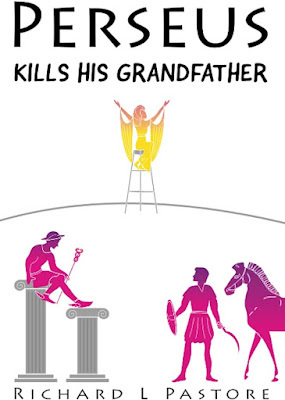
Perseus Kills his Grandfather by Richard L Pastore DNF
I bought the book along with his The Devil and the Wolf (My review of that book here.) when I saw on Berthold's blog that they were on sale for free. (See, another sale, and a sale is a sale.) I started with this book, but to be honest, I haven't had anything to do with Greek mythology since high school some 60 years ago, and had then, and still have now, no interest in Greek mythology, or anything Greek. I am happy to say that the story does not begin with a violent action scene to hook me, so that didn't put me off. However, due to my lack of interest in the subject, I switched to reading his The Devil and the Wolf instead, and while I enjoyed that book, I have yet to return to this story due, as I said, to a lack of interest in the subject. Maybe some day I will, since I didn't actually dislike it as I did the previous books. But don't hold your breath. I'm just not into the mythology or the era, and consequently, this story. Pastore writes humorous stories and this story is no exception. As with all these books, not finishing this book is on me and my tastes, not the author. If this sounds like your cup of tea, give it a sip.
Next week I return to a Furrowed Middlebrow book, and then it on to a new 12 book epic. Stay tuned.
September 27, 2023
SPFBO Observations, Reviews in General
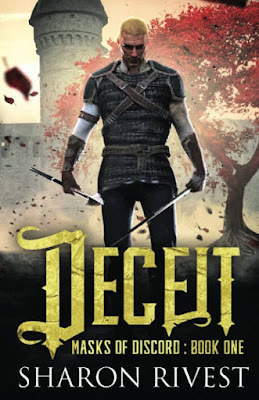
To illustrate this point, I'll use the story that sunk Beneath the Lanterns in the contest; Deceit by Sharon Rivest. It was chosen as a semi-finalist by Liis over my entry. The blog has to narrow down their selection to just one book, so the other members of the blog's reviewing team read and share their own views on each semi-finalist for their blog. You can read their entire reviews; here. But here is a sample of what everyone thought of Liis' chosen story.
Liis said of Deceit:
Sometimes,and it doesn’t happen often, you start reading a book and it justworks. Everything is exactly the way you like. The story flows, thewriting is smooth, the pacing is perfectly unhealthy for your heartrate but this is what we want! Every word, every bit of dialogue,every scene has captured you and before you know it, the book isfinished. Deceit wasthat book for me. I read a page and I just knew I was going to enjoythis. And I did, all the way to the end...
Deceit isstructured to follow the main character in two timelines, the presentand the past. This structure is imperative for a story as grim andbrutal as this. This!… is the perfect example of what I want mymain character to do to me – sink his teeth in me so deep that it’sas if I live through every disaster and tragedy right there with him.The character development – the internal conflict and guilt (man, Ido love a bit of guilt!) strike me as the perfect tools to make anystory interesting.
Whatit did incredibly well, for my tastes, was the mental anguish, thetorment of regrets, the heaviness that lies upon the soul of thatvery one character. If the author has managed to put that on paper,in written word? Magnificent!
Then we have Bjorn who only read half of the book before DNFing it:
Thebook begins in the future, with a battle where the best men have beenschooled by Mace personally. In the second chapter – one ofthe strongest, but completely confusing to me (I didn’t know therewould be multiple timelines) little Mace is sold by hisfather, who’s mostly concerned about whether the pouch of coin hereceives contains as much coin as he was promised. It’s too latefor me to be heartbroken, though, because I already know Mace will doquite well for himself. In chapter three, we return to the futurefrom the first chapter, while in chapter four we move to earlierfuture than the later future from the chapter before. When I amstarting to develop interest in someone, I have to re-shuffle mybrain to the other timeline, and by the time I’m back I eitherforgot why I cared for the character, or they left. Also, it’spossible for a character to die a dramatic death, only to reappear,younger and in perfect health, five pages later.
Thingis – Deceit isnot a bad book at all. It’s a semifinalist, because it was one ofthe judges’ favourite, after all. It just doesn’t work for me... Butthe real reason for my low score is that I could never forget I wasreading a book. I was not in the author’s world, neither did Iidentify with any of the characters. I was very much readinga book andthe ever-changing timelines sometimes made it feel like work.
Everychapter of the future builds into a mystery that somewhat plays offthe past...The past chapters let us understand Mace’s early life –where he was sold as a boy to apprentice in one of the houses,working its way up to the reasons behind his exile and finally –his need for revenge...Every chapter in the past was like watching atrain wreck happen in slow motion. Seriously, in my notes for him Iwrote, “Dammit!Why does his every decision make me dread finishing the chapter?”
Olivia read 40% of the book, and her take away was:
Iwould probably describe Deceit asa low fantasy grimdark road trip novel… Road trip novels are, bytheir nature, incredibly difficult to pull off; because charactersare often coming and going, an author needs a really deft hand inorder to flesh out those new characters in a hurry, over andover...As a grimdark book, Deceit neverreally managed to gut-punch me, and I spent more than a little bitwondering why this was. For a while, I wondered if I’m just jadedby several years of grimdark stories one-upping each other on thegritty violence scale—but I think this problem also comes down tothe road trip formula. Because the book never allows characters tolinger on-screen for more than a chapter or two, I’m not veryattached to them as a reader by the time bad things happen to them.
Paul's take after having read the entire book:
Basedon the synopsis alone, Deceit isa book that I expected to really enjoy. It promises a large amount ofgrimness, an intriguing revenge plot, and casts a grizzled oldermercenary as its main character. Sadly, though, the promised elementsthemselves didn’t quite come together, and it just wasn’tsomething that I could entirely connect with...As a character, Macewasn’t one I ever found myself engaged with. All of his problemsstem from his constant bad decisions, so it was hard to sympathize with him to any degree, and we don’t actually see him activelydevelop (physically, skillfully, or emotionally), he just becomes thegreatest warrior off-screen. There aren’t really any solidcharacters outside of Mace, so I found myself meandering through thestory rather than being pulled. One point I would have to mention,given that I have mentioned it with other books, is surprisingly poorhandling of the female characters. From what I can recall, therewasn’t a female character who wasn’t beaten, murdered, raped, orthreatened with rape (sometimes multiple times).
And finally we have Timmy's reaction, having read 52% of the story:
I’mgoing to be upfront and say right out that Deceit isnot a book I would have picked up for myself if I had the choice.Simply because it’s not my jam. I’m not a huge fan of epicfantasy, and I don’t have much interest in books centered aroundfighting and traveling. I fully expected to dislike Deceit,and I think I was the most surprised by the fact that I didn’t. Iactually think it’s pretty good all things considered, and I cansee it finding its audience. So why, could you ask, did I not finishreading it? I just wasn’t invested in the story enough tocontinue... I found young Mace’s timeline more interestingpersonally, despite the many training/fighting scenes. But then adultMace has enough fighting so there is that too. If you ask me, thereis way too much fighting and not enough character-building for mytastes. Either way, Mace’s background story was at leastinteresting, if a bit way too gloomy. Poor man rarely had any joy inhis life – far as I could tell, that is. Too bad the plot in thepresent timeline was dragging. By the 50% mark, I really couldn’ttell where it all was going.
So there you have it. Four takes on one book. I should also note that all the reviewers for the contest make a point to cut your throat as positively and politely as possible; balancing the positive with the negative, and pointing out that what doesn't work for them might work for another reader.
Next week, some more thoughts on what I learned from the contest, and Liil's review.
September 23, 2023
The Saturday Morning Post (No. 14)

In this post we come to the final installment of P G Wodehouse's Blandings Castle Saga, with two complete novels, one short story, and the incomplete first draft of Wodehouse's final novel, the story he was working on when he died in 1972, some 57 years after the first Blandings Castle story was published.
My reviewer criteria. I like light, entertaining novels. I like smaller scale stories rather than epics. I like character focused novels featuring pleasant characters, with a minimum number of unpleasant ones. I greatly value clever and witty writing. I like first person, or close third person narratives. I dislike a lot of "head jumping" between POVs and flashbacks. I want a story, not a puzzle. While I am not opposed to violence, I dislike gore for the sake of gore. I find long and elaborate fight, action, and battle sequences tedious. Plot holes and things that happen for the convenience of the author annoy me. And I fear I'm a born critic in that I don't mind pointing out what I don't like in a story. However, I lay no claim to be the final arbitrator of style and taste, you need to decide for yourself what you like or dislike in a book.
Your opinions are always welcome. Comment below.
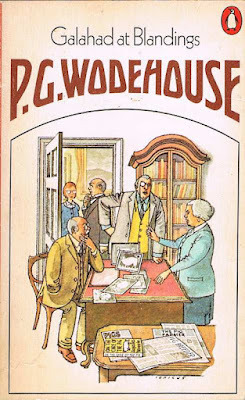
Galahad at Blandings by P G Wodehouse BThis story sees the return of Tipton, who we first met in Full Moon. You may recall that he is the young American who inherited the chain store, who had last visited Blandings to dry out, and ended up getting engaged to Lord Elmsworh's sister Hermione's daughter, the air headed Veronica. The story opens with Tipton briefly back in New York before his wedding in jail along with a friend in jail for disorderly conduct without any money for bail. Tipton, remembering that Lord Elmsworth is also in London for the marriage of his sister Connie to an American Millionaire we met in the last entry, uses his one telephone call to call Lord Elmswoth in the middle of the night, for the loan of $20 to get he and his friend out on bail, explaining that he has no money on him to raise bail. Lord Elmswoth obliges, and when he returns to Blandings mentions to his sister Hermione that Tipton touched him for $20 because he had no money. She jumps to the conclusion that Tipton's fortune has gone belly up- the story seems set around the time of the stock market crash - and rushes off to London to get Veronica to write a letter cancelling the wedding, as landing a rich husband for her is her prime objective. And when they find out, that wasn't the case... why would they believe anything the absent minded Lord Elmworth says... she and her husband need Galahad's help to get ahold of that letter to avert disaster.There's another love story entangled with this one, with the usual brace of imposters. Looked from a distance, all these stories look more or less the same. The enjoyment is in the the witty writing, the bright, brisk, inventive turn of a phrase.
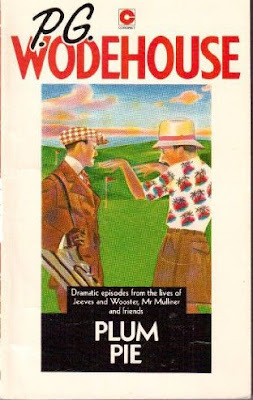
"Sticky Wicket at Blandings" in Plum Pie By P G Wodehouse C
A short story. In order to make a sale for Donaldson's Dog Joy biscuits, Freddie gives his wife's dog to a pretty potential customer, while she's in France for a couple of months, thinking that the can replace the dog. She telegraphs saying that she's returning to Blandings in a few days... A rather thin story this time around.
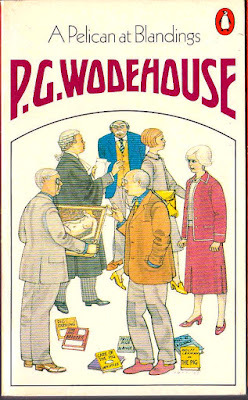
A Pelican at Blandings by P G Wodehouse BLord Elmsworth had been enjoying life at Blandings since all of this sisters are elsewhere, until Aunt Connie returns, along with her new step-daughter. To make matters worse, the Duke of Dunstable invites himself for an extended visit, bring along with him a painting of a naked lady that he hopes to sell for twice the price he paid for it to a millionaire who had intended to buy it because it reminded him of his last former wife. One of Galahad's godsons need his help to reconcile with his (former) fiancée who he had to cross examine as a witness to a car crash that he was the barrister for, and how resented how he handled the questing, buy getting him invited to Blandings where his ex-fiancée is staying. And there are imposters... There are always imposters.
This is a story from 1969. My impression, mostly from the Bertie Wooster stories is that as time went on, Wodehouse's stories grew more ornate, with lots of familiar phrases, and less original. At least in the Blandings Saga, I think they've gotten better as time has gone on. Of course the set up is always more or less the same, but I think the writing is crisper and the stories are well paced. The characters are not deep, and many are interchangeable, but that doesn't matter to those of us who love P G's writing. It his wit and turn of a phrase that we read these stories for.
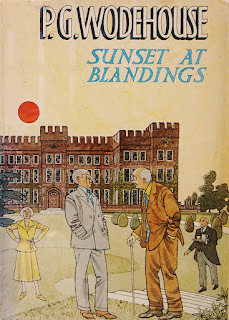
Sunset at Blandings by P G Wodehouse This is the partial (untitled) first draft of the Blandings Castle Saga that Wodehouse was working on in the hospital until his death. As such, it is only half written, and though readable, you can see that the story is somewhat sketched in. I gather that after World War ll, the Saturday Evening Post did not run serial novels, so that he had to trim his novels that appeared in that magazine down to 25,000 words, and that this story reads like one of those cut down versions. The story involves another of Lord Emsworth and Galahad's sisters - in this book they are said to have 10 of them, including one nice one, Diana, a widow who the an old friend of Galahad, now the Chancellor of the Exchequer was and still is in love with. Besides the first draft, there are extensive notes by Wodehouse on the remainder of the book, including photostats of his handwritten notes so that you can see how he wrote his stories. From these notes it was clear that this was still a work in progress, with alternative actions going forward. The notes also include some plot notes for another Blandings Novel, one that would have had Bertie Wooster and Jeeves making their appearance. In addition there are the drawings of and floor plans for Blandings Castle and a map of the estate, along with a discussion of how these drawings were drawn from the stories. And a discussion of the train service to London.
While the story is only half complete and nowhere near as polished as a completed novel, it is all the background information that makes this book nearly indispensable to fans of the Blandings Castle Saga.
Final thoughtsIf you have read my reviews, such as they are, it will be clear that these stories all share a more or less standard plot, though the plots can be very elaborate with many moving parts. They are also variations on a common theme; young people needing money for one reason or another, furthering or mending relationships between lovers by bringing one of the parties, usually under an assumed name in close proximity at Blandings Castle, plus a few side plots, usually involving the Empress of Blandings. The characters in these stories are pretty much cardboard characters, but corrugated cardboard; the regulars of Blandings Castle have a little depth to them, but most of the rogues and loving couples who appear as guests at Blandings Castle are interchangeable.
With my second reading of them, I have come to appreciate them more than I did in my first reading, in large part for Wodehouse's turn of a phrase, i.e. how he writes the story rather than for the story itself. I will say that I think that his Bertie Wooster and Jeeves stories are still my favorites. Being first person narratives, a reader gets to know Bertie far better than any of the Blandings Castle characters. Bertie is a deeper, more authentic character, though still far from a real life character. But then that's his charm. Still, these novels are perfect examples of what Wodehouse was trying to write; musical comedies without music. They are evergreen stories of a timeless age; it is always summer at Blandings Castle set in the lush, old-world countryside of a never-never England of the early 20th century. Just as there is a platform at Kings Cross for a train that takes you to Hogworts, there's a platform at Paddington that will take you to Blandings Castle. These books are your tickets.
September 20, 2023
My SPFBO 9 Experience
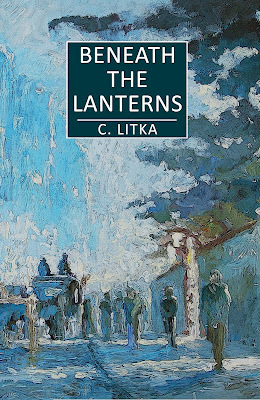
I regret to report that if you had any money riding on Beneath the Lanterns making it to even the semi-finals of the Self Published Fantasy Blog Off No. 9, you've lost your bet. Once again, all I got of one of these contests was the thrill of hope and anticipation, the agony of defeat, and a nice review. Not that I'm complaining, mind you, as it was a thoughtful and positive review. You can read the review here or on the Goodreads page for the book here. Statistically, making it to the final 10 was a 1 in 30 chance and winning the contest was a 1 in 300 shot. But given that part of the fun for me of writing this story was avoiding all the fantasy tropes I could think of, the odds were likely a wee bit longer.
For the record, I did write Beneath the Lanterns as an attempt to widen my readership by appealing to fantasy readers. You can read my thoughts on how I came to write the book here in two parts; Part One and Part Two Suffice to say that it is a post-apocalyptic story with its science fiction backdrop so remote in time and unexplored in the story that it reads as a fantasy story. Mark Lawrence did a similar thing in his first fantasy series setting it in our post-apocalyptic world, and he's the founder of SPFBO, so I think it passes muster as a fantasy. Still, I must confess that part of the fun of writing this story, as I said above, was tweaking the nose of fantasy expectations. For example, it is probably the only fantasy book written in this century where no character dies in the story. Heck, there's not even a real sword fight, not to mention you'll find no dragons, no folklore beings, no teen princesses/assassins, no evil kings, no epic quest or endless battles, no nameless evil to fight, and no magic system in it. It is not modern fantasy. So, in short, I have only myself to blame for Beneath the Lanterns washing out of SPFBO 9. I can live with it. In the end, it is far more fun to have fun writing what you want rather than what you think readers want you to write.
You may recall a previous past blog in which I reported that I volunteered to write one quarter of a four part short story for the blog that was reviewing my book for SPFBO. The complete story has now been published and you can find the final part here along with links to the first three parts, if you care to read it. I wrote the third part, followed by Jean Gill, who took the story in her own way with her own twist, bringing it back around to the beginning. I haven't looked back on my manuscript, but I have a vague feeling they tweaked my ending just slightly to make her ending work. In any event, I told you how I would've ended the story in that blog post so you can compare it to Jean Gill's and decide which one you like better.
One final note; I didn't bother to enter a book in the science fiction version of the contest for self published authors (SPSFC), this year, as I have in the last two years, nor do I have any plans to do so in the future. It appears they received only 221 entries this year, short of the target 300. (Compare that to the fantasy version that filled its 300 slots in something like 47 minutes.) I'm not surprised, since there didn't seem to be a great deal of interest in the SF version of the contest outside of the authors who had books entered in the contest - if that. So, with little to gain, and a risk of receiving a bad review, entering another of my books didn't seem to be worth the bother. Besides my most straight SF book would be my space opera, The Bright Black Sea, and it is way too long for the science fiction version of the contest. Though I must say that the fantasy version routinely has books of that size. fantasy being fantasy. The fantasy version of the contest is six year older, and since there is a much larger fan base for fantasy, there seems to be a lot more involvement and interest in the contest - at least amongst the reviewers. Even so, I didn't see any bump in sales from it either. I suspect that for any book to see a significant jump in sales it would have to be one of the 10 finalist.
I will offer some more thoughts about my experience in the SPFBO in the coming weeks.
.
September 16, 2023
The Saturday Morning Post (No. 13)

This is the third installment of my reviews of P G Wodehouse's Blandings Castle Saga. This time around we have four books.
My reviewer criteria. I like light, entertaining novels. I like smaller scale stories rather than epics. I like character focused novels featuring pleasant characters, with a minimum number of unpleasant ones. I greatly value clever and witty writing. I like first person, or close third person narratives. I dislike a lot of "head jumping" between POVs and flashbacks. I want a story, not a puzzle. While I am not opposed to violence, I dislike gore for the sake of gore. I find long and elaborate fight, action, and battle sequences tedious. Plot holes and things that happen for the convenience of the author annoy me. And I fear I'm a born critic in that I don't mind pointing out what I don't like in a story. However, I lay no claim to be the final arbitrator of style and taste, you need to decide for yourself what you like or dislike in a book.
Your opinions are always welcome. Comment below.
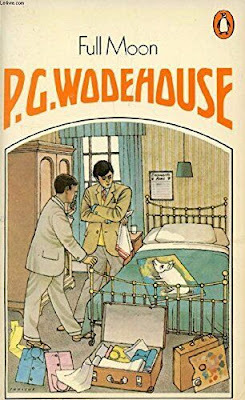
Full Moon by P G Wodehouse B
In this installment of the saga we have Lord Emsworth's sister Hermione Wedge (who looks like, and is often mistaken for a cook) and her husband Colonel Wedge along with their beautiful but dimwitted daughter, Veronica staying at Blandings. In London we have another of Lord Emsworth's sisters, Dora Garland whose daughter, Prudence, intends to elope with Galahad's godson, Bill "Blister" Lister who is an artist that has just inherited a pub outside of Oxford, one that Freddie Treepwood used to frequent back before he was sent down from Oxford. Prudence wants Bill to give up being an artist and become a businessman and run the pub, for which they would need money to make it modern. Bill has a face like "a kindly gorilla," or as a Victorian era novelist would say, "a magnificent ugly man." Freddie runs into Prudence on his way to sell Aunt Dora on Donaldson's Dog-joy and learns that she and Bill are going to get married at the Registry office that day. She invites Freddie to be their witness. Freddie then runs into Tipton Plimsoll, a young American chain store owner who's been on a several month long spree after inheriting the chain stores, and he invites him to the wedding as well. Before the wedding Tipton sees a doctor about some spots on his chest, and is told that he is in grave danger of alcohol poisonings, and is on the brink of a breakdown where he could start seeing things unless he stops drinking... What he ends up seeing is the ugly face Bill, here and there before the wedding, a wedding that doesn't take place because Aunt Dora caught wind of Prudence's unknown lover, and whisked her off to Blandings, "I ought to mention that all the younger generation of my family get sent to Blandings when they fall in love with the wrong type of soul mate. It's sort of Devil's Island." Freddie also invites Tipton there to affect a cure, and Bill gets invited down by Lord Emsworth, with the help of Galahad, to paint a portrait of the Empress of Blandings. Learning that Tipton Plimsoll is very rich, Aunt Dora and Colonel Wedge want Veronica to marry him... but Tipton learns that Freddie and once been briefly engaged to Veronica, and even though Freddie is happily married, he knows how easy marriages come and go in America, and thinks the worst of their now merely cousinly comradery, as well as still being haunted by Bill's face, as he's at Blandings as well... And so it goes.
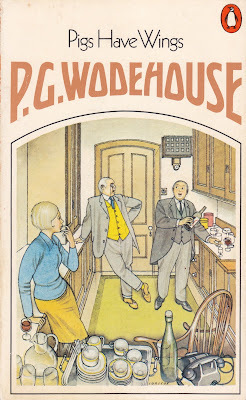
Pigs Have Wings by P G Wodehouse
Wodehouse stories tend to have complicate plots, so let's break out the set up for this story as an example. The usual suspects; Lord Emsworth, Galahad, Aunt Connie, Beach, and the prize fat pig, the Empress of Blandings are all in attendance. The story opens with two guests on hand, Penelope (Penny) Donaldson, the younger sister of Freddie's wife and the young and rich Orlo Vesper who Aunt Connie is pushing Penny to hitch up with. However Penny met Jerry Vail, on the boat from America to England and fell in love with him. However, he is not well off;
'Well, he gets by. He's self-supporting.' (says Penny)
'What does he do?' (asks Galahad)
'He's an author.'
'Good heavens! Oh, well, I suppose authors are also God's creatures.'
'He writes thrillers. But you know the old gag. "Crime doesn't pay... enough," We couldn't possibly get married on what he makes, even in a good year.'
'But your father, the well-to-do millionaire. Won't he provide?'
'Not for an impecunious suitor. If I were to write and tell Father I wanted to marry someone with an annual income of about thirty cents, he would whisk me back to America by the next boat, and I should be extremely lucky if I didn't get interned at my old grandmother's in Ohio.'
This Jerry Vail, however has a chance to get in on a new health spa for the rich scheme, but he needs 2000 pounds... Penny asks Galahad, but he explains that as the younger son, all he gets a meager allowance.
Also in attendance at Blandings is the new pig girl. Monica Simmons. (The old pig man won a football lottery and retired.) She was hired by Aunt Connie, and is the niece of their neighbor, Sir Gregory Parsole, who is the owner of a formidable rival pig that he just purchased from Kent, that intends to enter in the Fat Pig contest to be held in a few weeks, there being nothing in the rules to prevent him from entering an importing a fat pig. Sir Gregory has recently got engaged to one Gloria Salt, who thinks he's too fat, and has him exercising. Disliking exercise, he takes up the suggestion of his Butler to try a weight reducing concoction called Slimmo, and orders half a dozen economy sized bottles of the stuff while Beach was in the shop getting a bottle of the stuff for himself. Beach brings news of this development back to Blandings. Putting two and two together, Monica and Slimmo, sets off alarm bells with Lord Emsworth, Galahad, Beach (both of whom have money wagered on the Empress of Blandings) and Penny. They decide to call in professional help to guard the Empress in the form of Maudie, Beach's niece, who is running a detective agency left to her by her late husband. And it seems that, in her youth Maudie, was an acquaintance of Sir Gregory in his poor, wild youth.
The plot thickens, when we learn that Sir Gregory's fiancée, Gloria Salt, is not only an old friend of Jerry Vail, but until recently had been engaged to Orlo Vesper, who also happens to be an old school mate and friend of Jerry. Gloria has been invited down to Blandings and asked by Aunt Connie to find a suitable private secretary for Lord Emsworth. Gloria invites Jerry to dinner dangling the hope of landing the 2,000 pound loan he needs. Given the prospect of a chance to get the money, he cancels a previous agreed dinner date with Penny who was up to London for a day. Over dinner Gloria informs him that according to Hugo Carmony, Lord Emsworth's private secretary in Summer Lightning, if he learns to love and talk up pigs, he may be able to endear himself with Lord Emsworth after a few weeks in Blandings, and touch him for the loan of 2,000 pounds which he needs, so he accepts the post. And of course, seeing that Penny, Orlo, and Gloria all staying at Blandings Castle... the fuse is lit.
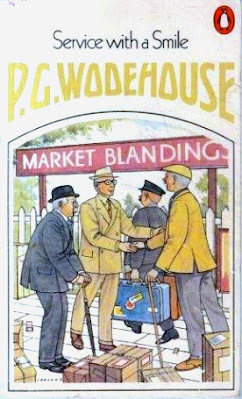
Service With a Smile by P G Wodehouse B
The story opens with one Myra Schoonmaker, the daughter of an American millionaire friend of Aunt Connie who has her staying at Blandings on account of an "unfortunate love affair" i.e. falling in love with a poor London East End curate the Rev Cuthbert "Bill" Bailey, along with the always rude Duke of Dunstable. We also have a new private secretary, Lavender Briggs for Lord Emsworth. As the story opens, Lord Emsworth has to go up to London for the opening of Parliament. When Myra learns that Aunt Connie will also be away from the castle for a day, she calls Bill and arranges to get married at of London's the register's offices... but over the phone Wilton Street is mistaken for Milton Street by Bill, and they end up standing each other up, they think. Bill Baily is an old friend of Pongo Twistleton, who along with his Uncle Lord Ickenham, were with Bill when Myra failed to appear at the Milton Street registry office. It seems that Lord Ickenham was a good friend of James Schoonmaker during his youth in America, so he has a great interest in the happiness of both Myra, and the Rev Cuthbert who he approves of, and so, when he meets Lord Emsworth as they return their costumes from the opening, he accepts Lord Emsworth's invite to Blandings, and his "friend", Bill, under an assumed name, of course, with the idea of mending the rift in Bill and Myra's love affair... And so it goes. We also have the Church Lads camping around the lake on the castle ground, much to Lord Emsworth's annoyance, the handsome, nephew of the Duke also arrives as Aunt Connie's alternative to Bill Bailey for Myra. He is an artist recently fired from the Mammoth Publishing Company who now needs a thousand pounds to get into his brother's onion soup stall business, plus a plot to, you guessed it, steal the Empress of Blandings. In short, a Blandings Castle Saga novel.
September 13, 2023
The Practice of Selling Ebooks for Nothing
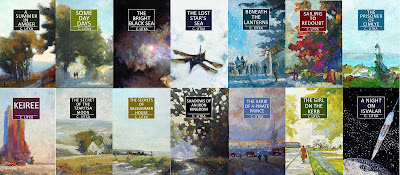
The practice of selling ebooks for free is dates back to the early years of Kindle, and beyond. There are four ways to use free ebooks to promote one's work. They all are designed to attract readers, with three of them also hoping to promote the sales of the author's other books at their full retail price.
The first method of using free ebooks is to offer an usually full priced ebook for free for a limited time; usually three to five days. You can only do this on Amazon when you are in the Kindle Select program on Amazon, and only for a limited number of times. I am unfamiliar with this program, so I can't really go into its details or how well it works from personal experience. I believe you can do this on other platforms as well. What I can say is that this method, with its brief widow of opportunity, offers the greatest incentive to hit that BUY button. I know I've collected a number of ebooks because of the nature of the sale; get it for free now, or forever hold your peace.
I believe that popular authors of books can sell thousands to tens of thousands of ebooks even in this limited window. There is a discussion of this on Reddit here. The main takeaway is :
"I f you're going for a 5 day freebie, you're going to want to crack the top 100 overall free. That's usually circa 1500 downloads in 24 hours for the bottom end with the #1 position requiring 20k+ (and sometimes much much more; a really good freebie can nab 100,000 downloads in a day with a BookBub+ stack)."
The top 100 referred to above is the overall Free Ebook list. Getting into the top 100 in various genre and sub-genre requires much less books sold. To get these types of numbers, you also need to couple the free promotion with paid advertising.
Reading through the other posts, it is clear that these promotions usually do not produce immediate, if any/many positive results to sales, ratings and reviews. The reason is that the incentive is to pick up the book now, not necessarily to read it now. I suspect that most of the free copies sold end up on the reader's thousand book long TBR list in their Kindle account. If you have to spend money advertising, advertising your free copies seems to be a questionable practice.
Speaking as a publisher, not as an author, I have to say that us publishers are concerned with only one number; sales. We don't care what people do with their books after we've made the sale. A sale is a sale. Any sale that leads to more sales is a bonus. And when you are selling something that costs you nothing, the conversion rate doesn't matter.
For a more typical result of free ebooks, here is an account from a self-publishing author, Ron Vitale. He writes in his blog:
In 2021, I gave away nearly 25,000 free books (I spent more than a thousand dollars on newsletter ads), but I didn’t make my advertising money back. In 2022, I gave away more than 5,600 books, but spent $0 in marketing on my fiction. So I wasn’t surprised to see that I earned so little on my fiction books this year (around $175).
I’ve had several readers in the last few years who have thanked me for the free ebook that I gave away through my newsletter, but they then apologized that they wouldn’t be able to get to reading it because they had hundreds of other free ebooks on their Kindle.
Free books used to work for me, but the publishing business has changed dramatically over the last few years, and I’m pivoting away in a different direction.
Ron Vitale offers the first books of his three fantasy book series for free, which is the second method of selling free ebooks. As you can see they earned him around $175 last year. Since they are still free when writing this post, he hasn't pivoted yet. (What do you pivot to?)
However, using the first book in a series to promote the series is a very popular reason for selling books for nothing. It's usually accomplished by listing the books for free in the other ebook stores and then getting Amazon to price match that price; i.e. make them permafree on Amazon as well, where you normally can't list your books for free, except for those brief sales. Because the book is always free, it lacks the urgent incentive to pick it up now, so you may sell less of them in the short run. On the other hand, because it is always available, readers who do take advantage of the free price are more likely actually interested in reading the book now than those who are grabbing it up during a short, limited time sales window to add to their TBR pile while the book is free.
How well the free first book in a series works depends on a number of factors, the two most important factors are, one how accomplished the author is and how polished the book is. And two, does the book work for the reader. I've picked up a number of free first in a series SF books - all highly rated - and I have to admit that not only did I not continue on with any of the series, but I don't think I ever got more than halfway through any of them. They didn't work for me. But I would never have even tried them without the free ebook. The alternative, as I talked about last time, is paying Amazon, or Facebook, or some promotional email company money to feature your books, and from what I can gather, you can't expect a great return on your investment going that route either.
The thing is that the conversion rate of that first free ebook in the series to go on to buy the retail priced books of the series need not be high to be successful. With a free ebook you are casting a wide net, reaching readers who would otherwise not be willing to pay for the book. It is up to the free ebook to convert them, and the better the book is, the more it will convert. But, as I said in my last post, ebooks are free to produce, so it costs nothing to give lots of them away to gain even the occasional conversion. All in all, unless you are happy with the number of books you are selling, you likely have nothing to lose by making the first book in a series free.
It only takes a couple of minutes to change the price of an ebook, so you are never locked into any one way of pricing your books. Indeed, without experimenting with price, you'll never know what works and what doesn't. Well, you may know what doesn't work. And if your price is working, you don't need to experiment.
A third way authors utilize free ebooks is to offer an ebook for free on their website, usually as an inducement to sign up for their newsletter, i.e. to get a email address to market to. I think a lot of authors offer a free novella or short story related to one of their series. The downside is that the author still has to get a reader interested enough to visit their website - probably by advertising/promotion - and then have the site set up so that a visitor is able to download a file on request.
The fourth way to sell free ebooks is to sell all or most of them for nothing all of the time. This is a rather radical approach, but there is a case to be made for it. Luck is often involved in the success of a book. The chances of getting your book into the hands of a book bellwether; i.e. someone who can create the buzz needed to sell books increases with the number of your books available, and the ease of acquiring them. The more books you have, the more likely lightning will strike one. The easier it is for a book to be read, the more likely lightning will strike one. Just say'n.
I've taken this approach from the beginning of my publishing business in 2015. As a writer, I want my work read and hopefully enjoyed. As a publisher, I want to serve the needs of my author-self, i.e. getting my books read. While lightning has not struck any of them, I have sold over 77,000 books and grossed something like $600 on the non-priced-matched books on Amazon without spending a penny on advertising nor have I lost money publishing my books. I have no way of knowing how many books I would've sold at any price or how much money my publishing business has left on the table by selling them for free. But I do know that I'm not writing the type of books that fit into the best selling mainstream of any genre, nor am I writing them fast enough, so I don't lose any sleep over the money I might've left on the table by sharing rather than selling my work.
People will say that no one actually reads free books. Of course not all the books I've sold have been read. But then that is true of paid books as well. I once read that half of the paid books on readers' kindles had not been read. And when you see stacks of paper books on avid readers' TBR pile awaiting to be read, it is clear that a lot of people buy books with good intentions, but may never get around to reading them, at least anytime soon. And, as I've said before, we publishers don't care what people do with the book after we sell it; a sale is a sale. Now, ideally it would be nice if they did read them, like them, and then go on to read more of our books. But if unread books are the cost of acquiring readers, it's still a bargain.
Offering all your books free is not a popular option. Indeed, I know of only one other author who publishes all his books for free, and that is Michael Graeme. No doubt there are others, but, as I wrote about in the first installment of this series, I have a feeling that most authors feel like many readers; i.e. the price of the book reflects the value of the book. Nevertheless, pricing your products below competing products is a marketing 101 strategy. Companies sell products at or below cost - loss leaders - to attract buyers so as to sell them other products at a profit. Hell, why do all the ebook retailers carry free ebooks at all - even Amazon? They don't make any money on the sale of a free ebook, so free ebooks must bring some other value to their table. My guess is that value is that free ebooks enhance their catalog by inflating the number of books they offer, which in turn, entices customers to their store who will also buy non-free books. And as I will point out one last time; an ebook costs nothing, and can be sold at a price of nothing without losing money and that sale serves a purpose, promoting the sale of the other books by the author, or, in my case, expand my readership, which is why I write books. Oh, and perhaps to add a little joy to the world.
So to summarize; unless authors have been hired or are under contract to write a book, no one owes them any money for doing so. They can ask for money, but it will be the market that determines the value of their work, not them. Selling ebooks for free is a no-cost and widely used way to attract readers, introduce your work, and perhaps sell more non-free books. A free price will not, however, automatically make them more visible to the broad market; only active promotion and paid advertising will do that. However appearing in the smaller, but still significant marketplace of free ebooks, they will be much more visible due to the fact that this is a much less crowded market place. The fact of the matter is that there is no good, cheap, and efficient way to sell books. Traditional publishers choose a limited number of books to promote each quarter, ("lead titles") and let the rest sink or swim. (Most sink.) These days deep pocket indie-publishers dominate the self-publishing marketplace, and unless you have both deep pockets and expertise, and have written a well researched mainstream book, any paid advertising will likely be no more successful in promoting your work than free ebooks would, and cost you a lot more.
So, there you have it; the philosophy, theory and practice of selling books for free. For readers, I hope you understand better why I sell my books for free, and any authors reading this, I hope I've given you something to think about.
September 9, 2023
The Saturday Morning Post (no. 12)

This week I review two books about my favorite year and place in history; London 1940. There is something, looking back in safety and never experiencing it, that I find so romantic about that summer of the first year of World War ll as viewed from London. It was an epic time, and the people who lived in that year knew it. Reading the accounts of that time, as I have, I think it is fair to say that they knew that whatever was to be, they were living history. Unless you care to believe in reincarnation, I have this sense of the time from reading the accounts of the people of that time. There are two SF books by Connie Willis, Blackout and All Clear set in Britain in this time period, and when I started reading the first, Blackout, I found that her picture of Britain in the summer of 1940 did not seem right to me. It is hard to describe, but I didn't recognize the Britain I had come to imagine in my mine, despite the fact that I could pick out scenes and incidents in her book that I had come across in my research as well. Despite high hopes for it, I DNF'ed it.
The primary source for my London in that eventful summer is Colin Perry's Boy in the Blitz that I discovered nearly 50 years ago in the University of Wisconsin library, and made a photo copy of it years later, which I still have. I've read at least parts of it off and on over the years. In addition to Boy in the Blitz, I will be reviewing Virily Anderson's Spam Tomorrow, an account of her life during the entire war in and about London and Britain in ebook, another book from the Furrowed Middlebrow collection by Dean Street Press that I purchased.
My reviewer criteria. I like light, entertaining novels. I like smaller scale stories rather than epics. I like character focused novels featuring pleasant characters, with a minimum number of unpleasant ones. I greatly value clever and witty writing. I like first person, or close third person narratives. I dislike a lot of "head jumping" between POVs and flashbacks. I want a story, not a puzzle. While I am not opposed to violence, I dislike gore for the sake of gore. I find long and elaborate fight, action, and battle sequences tedious. Plot holes and things that happen for the convenience of the author annoy me. And I fear I'm a born critic in that I don't mind pointing out what I don't like in a story. However, I lay no claim to be the final arbitrator of style and taste, you need to decide for yourself what you like or dislike in a book.
Your opinions are always welcome. Comment below.
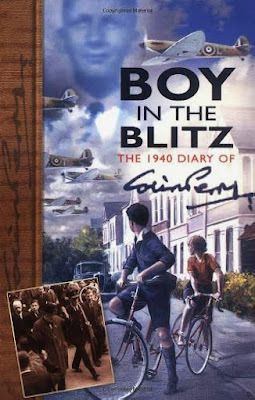
Boy in the Blitz by Colin Perry A
As I said in the intro this books is composed of the journal entries and letters of the 18 year old Colin Perry, who was working in London and living south of London in Tooting. It covers the period from Monday 17 June, 1940, soon after the fall of France and the Dunkirk evacuation, to Tuesday 5 November 1940 when he joins the Merchant Marine. On 17 November, he sailed on the H.M.T. Strathallan, destination unknown, as a ship's writer i.e. a clerk. He was later to become a ships' purser. In often daily entries he recounts "what was going on in my mind and of the sights I saw about me. It contains, therefore, no after-thoughts only the youthful, untrained outpouring of a proud and totally insignificant Londoner." The fact that you are reading the words of a bright, articulate young man who didn't know what tomorrow would bring as he writes his entries, brings an immediacy to the story that can not be found in accounts written looking back on an event.
As I said, this is an unique period. Britain stand alone facing the all-conquering German army stands 10 miles from Dover. A German invasion is expected almost daily. German airplanes are flying overhead, dropping bombs, sometimes apparently at random. Increasingly the sirens sound, becoming a nightly affair as does drone of German bombers overhead, the whine and thump of bombs landing near and far, while the the searchlight probe the sky and the antiaircraft guns rattle and roar. And still, every day, Londoners go off to work in the city, heading down to bomb shelters several times a day as the raiders fly overhead. London suffers damage, people are wounded and killed, and many made homeless, but on a scale that will be dwarfed latter in the war, in such actions like the fire bombing of Dresden, and the atomic bombing of Hiroshima and Nagasaki, and as such, I find that this first year of the war has a sort of steampunk feel to it; a brief interlude where World War l evolved into World War ll proper. Distance dulls the death and terror, but the romance of a nation a city and a people standing up and defying the triumphant Nazis remains. This book, I think, captures that perfectly.
The ebook version adds a bit of biography, some photos, and outlines Colin's adventures at sea during the war, a welcome addition.
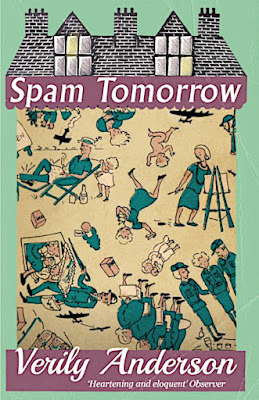
Spam Tomorrow by Verily Anderson B
This is a memoir of the author's experiences in World War ll, published 11 years after the end of the war. The book draws on her extensive diaries of the time. It begins in 1939 with her marriage. At the time she was a member of F.A.N.Y., First Aid Nursing Yeomanry, a female volunteer organization dating back to World War 1 that wore military uniforms, but were not part of the military. They performed a variety of functions, Verily being a driver for various military and medical vehicles.She performed these duties until she suffered a long term illness, and was released for medical reasons (more or less) In 1940 she had her first child, and suffered serious after affects that had her laid up ill for many months.
The story goes on to tell of the hardships of life in Britain during the blitz, and the nearly six years of war. Since her husband worked for the government, they lived in London, off and on, depending on what they could find and afford, and the effects of the constant bombing on their life, often taking in other mothers to share expenses.
Anderson is an entertaining writer and tells an interesting story of her struggles of often ill health, raising a family, and getting by with a war raging, often overhead. It introduces many people, from her siblings, cousins, to American soldiers training in England for D Day. If you have any interest in World War 11 on the British home front, it is an authentic window into that world, written not long after the events described.
September 6, 2023
The Theory of Selling Ebooks for Nothing
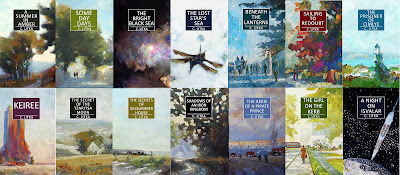
The theory of selling ebooks by offering them for free is simple; it eliminates nearly all the friction involved in buying an ebook. The potential reader sees the book and the free price, and if the book sparks any interest at all, they move their cursor to the BUY button and click. Bingo! Sale closed.
Of course you've made no money on that sale, but on the plus side, you haven't lost any either. The only thing you may have lost is the opportunity to sell that book to that customer for money. You can judge how likely that prospect was for yourself. On the plus side, you have created the possibility of that reader enjoying the free ebook and going on to buy more of your books with higher price tags, books that they would've purchased if they had not sampled your free ebook.
The fact that copies of ebooks cost the author nothing to produce means that they can be sold for nothing without losing money. Oh, there is often some fixed cost associated in the production of an ebook, but that cost is fixed, i.e. it is the same whether one sells one book or a million, so there is no way to attach a set cost to individual books, as it will vary by the number of books sold. You might as well just look on it as the franchise cost, the price of starting your publishing business.
In practice, free ebooks are most often used to sell the other books that an author is offering for more than nothing, i.e. a form of advertising. Since giving free ebooks away involves no out of pocket money, you can give away a million free copies to a million readers at no cost. On the other hand, active advertising can cost money, and a lot of it, if you want it to be effective.
In advertising you pay either every time someone sees your ad, as in Facebook ads, or every time someone clicks on your ad, as in advertising on Amazon. You can also pay to place your book in various book related newsletters like BookBub. I've never advertised any of my books, so I can say nothing about how effective, or not, advertising is from personal experience. I do, however, believe that some sort of promotion and/or advertising is, in 2023, essential for commercial success in indie publishing and for it to be effective, a fairly large advertising budget is required. Even so, free books have a place in that effort as well.
Advertising is only one factor in the formula for commercial success in indie publishing, and I think I can say that advertising alone will not be successful unless you are promoting a book that is on point for the target market. Even so, the ads themselves will often cost more than the royalty the sales brings in. Ryan Cahill, a best selling indie fantasy author spends something like a thousand dollars a month on ads. He has said that he probably loses money on each book he sells from one of his ads. Nevertheless he feels they are worth the money spent since that book sale often leads to sales of his other books. (Pro tip: don't advertise your book before you have several books to sell.) Ideally what advertising and other promotional activity does it to build buzz that gets people interested and talking about your book. It is readers who really sell books. That said, you also need ads to continuedly keep your books on reader radar, since with so many books to choose from, readers can easily forget about yours. For that reason, if you want to be a commercially successful author, you will need to run ads continually - as well a produce books every few months... Free ebooks alone won't do it.
However, if your goals are less lofty than making a living as a self-published author, or your budget is limited, the ease of selling a book for nothing may be a good way to expand your readership. Still, there's a catch, there's always a catch. And that catch is that free ebooks do only half of what paid advertising does; while it can can put a book into the hands of a reader more readily than a book with a non-free price, what it can't do is get your book before the eyes of potential customers. Readers still have to find your free ebook to buy and try it. The big advantage of paid advertising is that it places your books before the eyes of potential buyers. A free price alone won't make your book any more visible. Or maybe it will...
There are readers, and lord knows, I'm one, who are accustomed to reading books without having to pay (or pay very little) for them. We borrow the books from the library. We pick them up at yard sales for next to nothing. And we shop for free ebooks on all the major ebook retailers. I have a feeling that we are a distinct sub-category of readers - a distinct market. And while it is obviously not a lucrative market, it is still a fairly substantial market. What is important about this market is that there are far fewer ebooks in this market to compete with. Your free ebooks are far easier to find in this market than a retail priced book in the paid market. There are millions of ebooks on Amazon, but the free ebook market probably has only 100,000 ebooks at any given time. Amazon even offers lists of 100 free books for almost every sub-genre, making your books far more readily visible to these bargain readers. Most other retails also list free ebooks by genre, making discovering your book a simple matter of scrolling through a dozen web pages of the appropriate list. Plus, many of these free ebook readers are avid readers, hence the necessity of acquiring books on the cheap. They will take the time to scroll through those pages to eventually come across your free ebook, And they might even spend money to read your full price books, if they are impressed enough with your free ebook. Anything is possible.
All of which is to say that free ebooks, when considered their cost, i.e. nothing, and the possibility that being free will bring them to the attention of more potential readers makes them a good method of promoting an author's work. And because of that it is one that many authors use.
In next week I will conclude my manifesto with "The Practice of Selling Ebooks for Nothing." I'll take a closer look at the ways and various outcomes of selling ebooks for free. Stay tuned.
Oh, by the way, shown above are some free ebooks: Links to the various stores that offer them in the right hand column.



